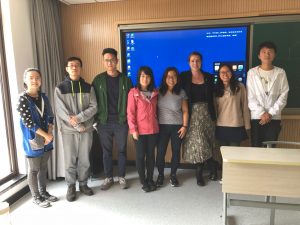(By Dr. Rachel Mairs)
I recently returned from a month-long fellowship at Fudan University, in Shanghai, where I had the chance to co-teach a course on the archaeology of Central Asia with my colleague Professor Wu Xin (https://independent.academia.edu/WuXin3). My stay was generously sponsored by the Fudan Fellow Program at the Fudan Institute for Advanced Study, and the Department of History, whose chair, Professor Yang Huang, is an historian of ancient Greece.

Shanghai is an ultramodern and rapidly-developing city, but the Fudan campus is an oasis of greenery and calm, north of the city centre. The University was founded in 1905, and is very prestigious. The Department of History has specialists in a wide range of fields – including, as one might expect, ancient and modern China, but also the Greek and Roman worlds. The Department is located in the twin high-rise Guanghua Towers, whose modern design is complemented by a portico flanked with Corinthian columns at the base.

My friend and host, Wu Xin, specialises in Achaemenid Central Asia and has an archaeological field project in Uzbekistan. There are few centres of research and teaching on Central Asia worldwide, so being able to co-teach with her on a course devoted to the history and archaeology of Central Asia was a rare pleasure. Our students were a mix of undergraduates and postgraduates, some new to both Central Asia and the ancient world, others with professional museum experience or existing expertise in ancient languages.

Drs Rachel Mairs (third from right) and Wu Xin (fourth from right)
with some of their students.
As well as teaching classes, I had the opportunity to give a lecture to colleagues and students in the Department of History on one of the most fascinating archaeological sites in the Hellenistic world, Ai Khanoum in Afghanistan. The advertising poster (below) helpfully points out that I will be speaking in English, although in practice, in both the lecture and in class, Wu Xin and other colleagues helped out with some simultaneous translation.

Shanghai was an excellent place to reflect on some of my main scholarly interests: long-distance cultural connections in the ancient world, and how modern colonialism and empires have shaped our understanding of ancient societies. On a visit to the Shanghai History Museum I came across a fascinating bilingual Latin-Chinese banner, which belonged to St. John’s University, a now-defunct institution founded by American Christian missionaries. I’m very grateful to my hosts at Fudan for their warm welcome, and for giving me the opportunity to teach and research on topics so close to my heart, in a location with such historical resonance.


